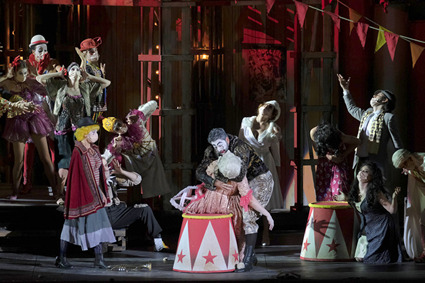| Opera Reviews | 25 April 2024 |
Cav & Pag bring the Arena back to lifeby Silvia Luraghi |
|
Mascagni: Cavalleria Rusticana |
|

Pagliacci: Yusif Eyvazov (Canio), Ensemble
|
|
|
After a concert performance of Aida conducted by Riccardo Muti, Verona’s Arena opened its 98th summer festival with the first staged production since 2019. In 2020, under dire restrictions on the size of the audience, the festival could only offer a number of galas and recitals. This year, in spite of the pandemic still going on, safety measured allowed an occupancy of 6,000. In practice, about half of the normal pre-covid seats can now be filled, and this gives an almost normal look to the stalls of the ample amphitheater. To avoid crowding the stage and the backstage the artistic direction this summer chose an innovative staging technique, heavily relying on 3D images broadcast on huge LED screens and only minimal actual structures or objects to create the scenes. The classic double bill of Mascagni’s Cavalleria Rusticana and Leoncavallo’s Pagliacci opened the season in new productions by Gabriele Mucino. The setting of Cavalleria was a black and white, verismo-inspired Sicilian village. Against the projected sets a physical staircase allowed movements, while some tables and chairs on a side evoked Mamma Lucia’s tavern. The chorus was placed off the stage on the left side and masked actors and dancers moved on the stage. In contrast with the monochromatic setting of Mascagni’s piece, Pagliacci featured a colorful cinematic stage, inspired by Federico Fellini’s movies with extras dressed as their best known characters. In the cast, baritone Amartuvshin Enkhbat provided a linking thread as he covered the role of both Alfio in Cavalleria and Tonio in Pagliacci. The baritone is endowed with a huge voice, very well suited for the Arena, that he can adequately soften in the high register, and has increasingly effective interpretative skills. I found him especially compelling in Pagliacci in which he fittingly stood out as the instigator of the action right from the beginning when he sang the Prologo aria on the fore stage sitting on a film director's chair. In Cavalleria, his antagonist was Turkish tenor Murat Karahan, a partly arrogant, partly doubtful Turiddu. His confrontation with Santuzza, soprano Sonia Ganassi, captured the audience with its heated tension. Lola, Clarissa Leonardi, and Mamma Lucia, Agostina Smimmero, were also very compelling in their roles. In Pagliacci the protagonist Canio was Yusif Eyvazov. I found him very compelling theatrically: he acted with commitment and his Canio was clearly violent only out of despair. Vocally, in spite of a somewhat throaty emission, his interpretation was on the whole more than acceptable especially thanks to him not overdoing the ‘veristic’ effects such as crying or shouting. Soprano Marina Rebeka was a provocative Nedda, with a ringing voice and a very well tuned high register. The orchestra played under the reliable baton of Maestro Marco Armiliato. The performance was very successful, and not only on account of the audience’s appreciation, but also for the palpable relief of being back to (almost) normal after the nightmarish months of the pandemic.
|
|
| Text ©
Silvia Luraghi Photo © Ph. Ennevi / Fondazione Arena di Verona |
|







